Education in times of war: high school education rules are changing in Ukraine

Today, Ukrainian schoolchildren are children of war. They lose their homes, their relatives, their usual childhood. But despite this, they study. Their right to education became not just a social norm, but a gesture of resistance. In a situation where a large part of schoolchildren study remotely, change their place of residence or stay abroad, the state tries to provide students with a more flexible and individualized learning path. The introduction of specialized education, the opportunity to independently choose subjects according to interests, the reduction of compulsory subjects and the new structure of the upper school — all this is aimed at supporting children in difficult conditions and giving them a chance to focus on their own future. Therefore, the reform of the high school, which will start in 2025, becomes not only an administrative decision, but also an attempt to adapt the educational environment to the needs of the new generation – those who grow up to the sound of sirens.
The essence of the changes: personal choice instead of a rigid standard
Ministry of Education and Science of Ukraine solidified new Standard educational program for grades 10–12. This document is a logical continuation of the “New Ukrainian School” reform and its senior link – the so-called “Profile School”. It is about the transition from a unified model of education to a personalized trajectory: each student will be able to choose his educational profile depending on interests, abilities and future plans.
The new program envisages three main directions: humanitarian, social and STEM (science, technology, engineering, mathematics). Electives can be added to each profile, from artistic disciplines to specialized courses, for example, in applied mathematics, the basics of entrepreneurship or critical thinking. For the first time, the state openly declares: school should not only teach, but also give teenagers space for self-determination.
The tenth grade is an orientation year
All tenth-graders will begin their studies according to the same schedule — this will be an adaptation stage where students get to know different subjects and areas, try themselves in new roles, and analyze what is closer to them. This approach allows you to avoid the wrong choice of profile under the pressure of parents or due to immaturity at the age of 14-15.
At the end of the tenth grade, students will complete an internal career orientation analysis, after which they will choose a profile for the 11th and 12th grades. The student’s decision will be key, and the school will only help orientate.
Grades 11–12: focus on specialization
From the 11th grade, the schedule of students will change significantly: 5–8 compulsory subjects will remain, the remaining hours will be devoted to specialized subjects and optional courses. Such a structure allows for in-depth study of exactly those areas that are of interest to a teenager: literature and journalism, biotechnology, economics, law, programming or psychology.
Instead of compulsory study of the same set of disciplines for everyone, the child independently forms his educational environment. For the generation of war, this is especially important: the ability to control at least something in a reality where most things are out of control.
Flexibility for schools and a new logic of educational organization
The reform of the internal structure of the senior school is separately provided for. Educational institutions will be able to create variable groups – this will allow classes to be formed not according to the principle of one fixed composition, but according to the subjects chosen by the students. One teenager may attend history lessons with one group and programming with another. This is not just a new schedule organization mechanism, but a manifestation of trust in the student as an independent subject.
Schools will also have the right to adapt the content of non-core subjects. For example, if a class with a preference for STEM students is studying literature, the teacher can reduce the emphasis on literary analysis and instead focus on stories relevant to teenagers. Conversely, the humanities class will be able to immerse themselves in intertextual connections and concepts.
The typical educational program for grades 10-12 is another step towards a modern school that is focused on people rather than formal standards. For the children of war, such a reform is not just an opportunity to decide on the future, but a chance to feel again that life goes on. And that even in a country where sirens sound every day, you can and should dream, choose, plan. Because the new school is not only about knowledge, it is about hope.





